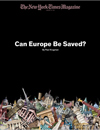“Can Europe be saved?” So leads the New York Times in its Sunday Magazine with a series of articles on Europe’s economic woes, kicking off with an essay by Paul Krugman. “There’s something peculiarly apt about the fact that the current European crisis began in Greece,” writes the Nobel prize-winning economist. “For Europe’s woes have all the aspects of a classical Greek tragedy, in which a man of noble character is undone by the fatal flaw of hubris.” European hubris lies in the creation of the euro, Krugman explains, “supposed to be the finest moment in a grand and noble undertaking: the generations-long effort to bring peace, democracy and shared prosperity to a once and frequently war-torn continent. But the architects of the euro, caught up in their project’s sweep and romance, chose to ignore the mundane difficulties a shared currency would predictably encounter — to ignore warnings, which were issued right from the beginning, that Europe lacked the institutions needed to make a common currency workable. Instead, they engaged in magical thinking, acting as if the nobility of their mission transcended such concerns.”
Paris bureau chief Steven Erlanger profiles the “odd couple” at the heart of what Krugman terms the “Euromess” - German chancellor Angela Merkel and French president Nicolas Sarkozy – “She makes fun, in private, of the way he walks and talks, of his rapid, jerky gestures and facial grimaces. He mocks her deliberation, her reluctance, her matronly caution… They are the best hope Europe has for continued unity. But they do not like each other at all.” For the EU to work, however, “Sarkozy and Merkel have to get along.”
Do you like our work?
Help multilingual European journalism to thrive, without ads or paywalls. Your one-off or regular support will keep our newsroom independent. Thank you!












